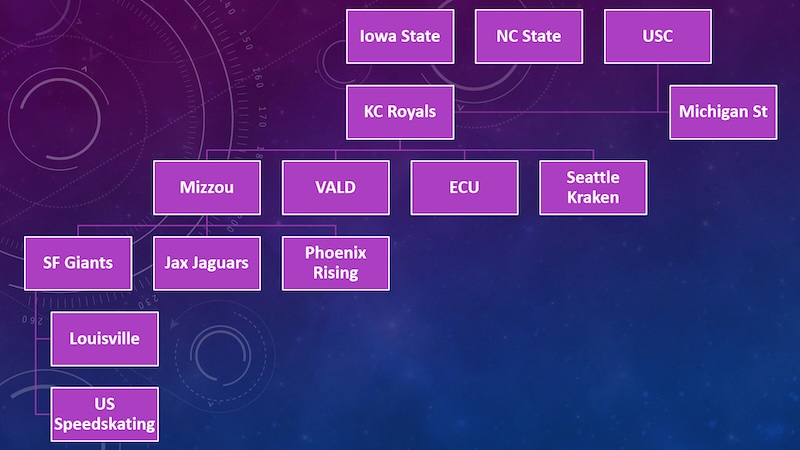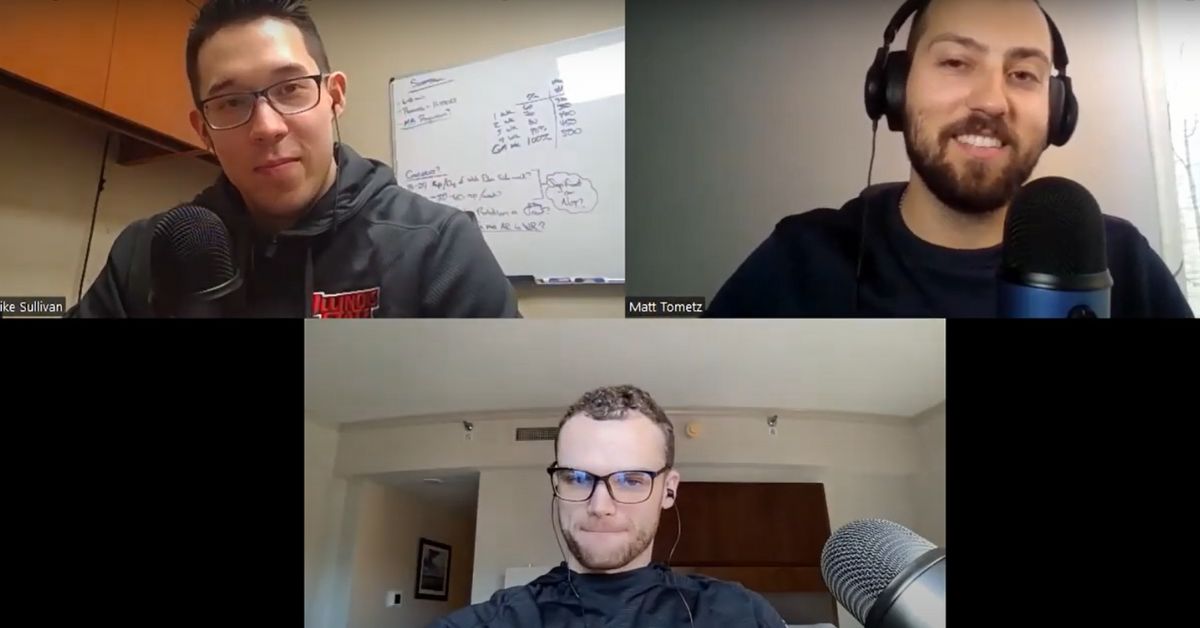In a unique field that can be just as giving as it is—at times—draining, coaches need equally unique solutions. In the same way there’s no “one-size-fits-all” solution for training athletes, there’s also a lot of nuance that comes with each next level of progress as a professional. Although traditional advice you’ve probably heard before does apply in this professional pursuit, real-life application and learning from personal experience is how you take general advice to a an always-changing field.
I’m not here to act like I came up with this advice myself or that this is the first time these pieces of advice have been spoken into existence. I’m just here to say from being in the field since 2016, from the countless conversations I’ve had with knowledgeable and selfless coaches, learning from my own mistakes and failures, and from feedback I’ve gotten from sharing this advice with coaches younger than me, I believe it’s valuable to pass along.
Although the core concepts of these three pieces of advice might be a little cliche, hopefully the phrasing and application are not. And let’s be honest, cliches are only cliches because they’re overused, and they’re only overused because they’re true; no one would be perpetuating inaccurate advice. Let’s dive into three simple ways that you can start setting yourself up for more professional success.
1. Be a (Respectfully) Savage Texter
The challenge we run into is two-fold: odds are, if you’re doing great things and trying to get ahead in this field, you’re very busy. And on the flip side, odds are, if someone is interesting enough to stay in touch with and provides a lot of value to you, they’re just as busy—if not even more so. I’ve been fortunate enough to have been given time by many smart and kind people, sometimes 45 minutes and sometimes up to 3 hours. But in the unusual and almost-always-extended hours we work in this field, carving out an hour to hop on the phone might not always be the most feasible or respectful use of someone’s time.
In the unusual and almost-always-extended hours we work in this field, carving out an hour to hop on the phone might not always be the most feasible or respectful use of someone’s time, says @CoachBigToe Share on XThere’s plenty of advice—like commenting on everyone’s Instagram posts to show you see it—but nothing makes me roll my eyes harder more than receiving 3 fire emojis on an Instagram post. Or how I used to tag all the relevant people in my tweets to try to spark discussion, which, even as the creator of these discussions, I found the notifications very annoying.
So, what’s just as simple and actionable, but still genuine and not annoying? How do you maintain somewhat frequent contact without blowing up a colleague’s phone, respecting their time, and keeping it personal? Insert texting.
Here’s a story of when this first hit me:
The first few years of my full-time coaching career, I went very hard in the proverbial networking paint. Intentionally reaching out to people, hopping on the phone, connecting with the people they then connected me with, keeping track of it all in Excel (obviously), and so on. It got to a point where I had a solid base of people whom I had 3rd and 4th interactions with. I was sharing these experiences with Steve Breitenstein, a colleague and mentor who inspired much of this article (and my other articles as well), and I said, “I feel like I only text these people when I want to hop on the phone, I don’t want it to feel like I’m just using them for that.”
“When’s the last time you texted them about anything else besides that?” he replied. Cue the awkward silence and instantaneous self-reflection.
Steve then gave examples of how to stay in touch beyond just hopping on the phone:
- Stay up to date with their sports team and send a congratulations text after big wins.
- Genuinely comment on a social media post of theirs that you enjoy (not every single one).
- If they come up in a conversation that you’re having with someone else, send a text saying ‘hey, I thought about you and referenced a prior conversation of ours with someone else, thanks for that.’
That’s how you turn professional relationships into more personal ones, slowly and consistently over time.

And, admittedly, there have been many times in the past that I’ve thought about someone like an athlete or colleague or parent but didn’t send a text, and I wish that I had. Would it have had a gigantic impact on our relationship? Probably not. But would it have improved it compared to not sending the text at all? Absolutely.
Main Lesson: Don’t be obnoxious or abuse having someone’s phone number, but be genuine in sending a simple text when you think about someone or something relevant to your relationship/previous conversations. It’s a simple way to help your professional relationships turn into more personal ones over time. If you’re thinking about sending someone a text, send it.
2. Keep a ‘Problem Solving’ File
Training principles are the same for all athletes, everyone is given the same textbook for the CSCS exam, and everyone’s journey probably starts out in a pretty similar fashion (as an intern, fingers crossed that it’s paid). But one thing I believe is that although the correct answer is usually “it depends” when talking about the art and science of coaching, true expertise lies in nuance and being able to explain that. Your ability to say, “It depends and here’s why,” followed by a personal experience or two to show how you’ve developed your spin on that topic is huge in showing your value and knowledge.
Your ability to say, ‘It depends and here’s why,’ followed by a personal experience or two to show how you’ve developed your spin on that topic is huge in showing your value and knowledge, says @CoachBigToe Share on XA classic job interview question I’ve faced multiple times is “tell us about a time you handled adversity in the workplace.” And that’s definitely a common format of an interview question: “share a story about” then insert anything like “dealing with conflict” or “having a tough conversation with a head coach” and so on.
For this anecdote, I’ll talk about adversity. As I was preparing for it a few days prior to an interview, a few stories immediately popped into my mind. The two examples I had ready were a little outdated and didn’t feel strong enough to demonstrate my problem-solving abilities. Then, fortunately, a fantastic example I forgot about hit me the night before the interview. I was saved at the last moment by recalling that more impactful story, but imagine how much less nerve-wracking my preparation would’ve been if I thought of that one right away? Had I already had a catalog of examples written down, how much more efficient that process would’ve been?
Additionally, being able to recall previous experiences is valuable in other situations, such as mentoring others. Being able to say to a colleague or younger coach, “I totally understand where you’re coming from, I’ve actually been through something similar (insert your own story).” Imagine how much more receptive that person would be compared to just saying, “That sucks, here’s some unsolicited advice.”
Spend a little bit of time on the front end to save yourself time on the back end (and save a headache) by writing down your stories as they come. It should be more detailed than it is not, but 5 to 10 bullet points of each big experience in your journey will set you up for a lot of success. Either as a note on your phone or a Word doc on your computer:
- Introduction/background
- When it happened
- How things progressed
- Thought process when evaluating your options
- Setbacks (if any)
- How the situation was resolved
Combine this with a general category of “adversity,” “training philosophy,” “difficult conversations,” or any traditional interview question and you’ll have a great ‘problem-solving file.’
Lastly, this catalog can be valuable to yourself personally. Being able to reflect on your journey puts things in perspective and helps you appreciate all the moments, big or small and positive or negative, that have brought you to this moment right now.
Main Lesson: Every few weeks, spend some time recalling, categorizing, and writing down your important stories and experiences to help out both yourself and others.
Every few weeks, spend some time recalling, categorizing, and writing down your important stories and experiences to help out both yourself and others, says @CoachBigToe Share on X3. It’s About What People Know You For
Going back to my hardcore networking days, it’s crazy to reflect back on the literal networking tree I had and all the branches of how people got there. The tree was so impressive it would come up in conversation, and after showing it to someone to demonstrate how I got connected with them, that would be followed up with something along the lines of, “You must be a good person if all those people kept passing your name along…”

And at first, it was very flattering. But that comment was always followed up by “…so I’d be happy to connect you with my people, but I can’t speak for you as a professional because I just haven’t seen you work.”
We’ve all heard it before when first getting into the working world and receiving networking advice: “it’s all about who you know.” Although that’s true, that’s only part of it. The product of even more conversations with Steve led to the rephrasing instead to: “it’s all about who knows you.” It’s about who knows you well enough to vouch for you, to toss your name out there and recommend you—not just personally, but also professionally.
But there’s a third iteration of this advice that recently hit me…let’s say you do get to a point where people in your network are willing to vouch for you and say, “I know Matt, he’s a great guy” to their colleagues or whoever it may be. Odds are that sentence will be followed up with the context, such as “we had a few great phone calls” or “he was super helpful on this one Excel problem” or “he connected me with a few of his colleagues with similar interests.”
Once someone knows you, that’s followed up with what they know you for.
I know what you’re thinking next, “But how do I ‘work’ for those people to show myself as a professional if they’re far away and I already have a job?” or, “How do I get someone to ‘know me’ just through the phone and computer?”
The answer? Creatively. It starts with a genuine phone call, then a few thoughtful texts (like I talked about above…woah…), having a thoughtful social media profile (as a “living, breathing resume,” another Steve quote) so they can see you as a “professional” from a distance, then offering your time/help whenever you can. It can be offering to solve an Excel problem they said they’ve been having, or opening up your network to them if they’re looking to connect with a specific type of person you know, or simply acting on their advice and following up with how it went (I talked about this relative to being a good mentee).
Main Lesson: Pivot from “it’s all about who you know” to “it’s all about who knows you.” Be creative in finding ways to show your value and getting others to know you for both being a good person and a great professional.
Pivot from “it’s all about who you know” to “it’s all about who knows you.” Be creative in finding ways to show your value and getting others to know you for both being a good person and a great professional, says @CoachBigToe Share on XNow It’s Just Action
I love a good quote, a good metaphor, or a complex topic boiled into a simple phrase. But at the end of the day, if you want to improve yourself, you need to take action and make it happen. Hopefully it was obvious how each of the three pieces of advice have simple action items that you can do starting tomorrow (or even today…) to start creating better connections and setting yourself up for more professional success in the future. Good luck, be genuine, and do these things over a long period of time.
Since you’re here…
…we have a small favor to ask. More people are reading SimpliFaster than ever, and each week we bring you compelling content from coaches, sport scientists, and physiotherapists who are devoted to building better athletes. Please take a moment to share the articles on social media, engage the authors with questions and comments below, and link to articles when appropriate if you have a blog or participate on forums of related topics. — SF






